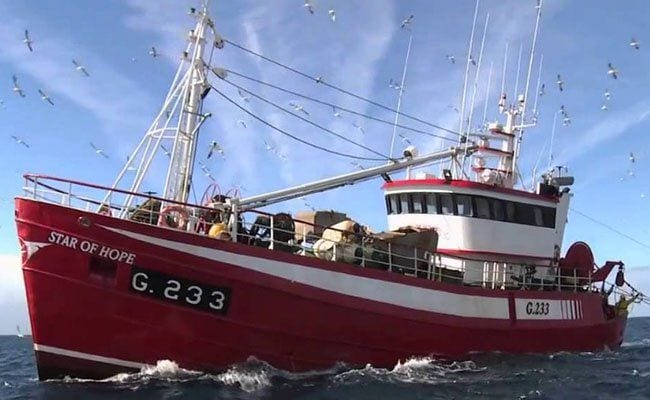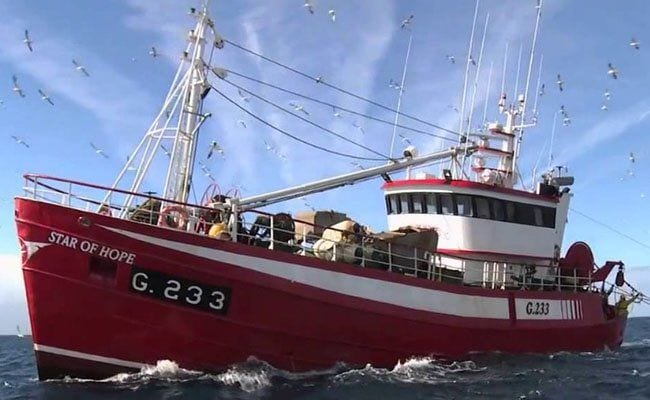
Over the next few years, “end of days” style documentaries will become a fixture in the independent film community. In a world where fictional characters Dom Toretto and Baby Groot get all the production money for their development, these important accounts will necessarily be low budget; they will be stocked with foreboding statistics, interview clips, and a mixed bag of filmmaking which may veer toward inexpensive, visually unappealing cell phone footage. Of course, these films will be relevant, but salience alone is not enough to stick with an audience in an age when thousands of arguments stream across our TV and computer screens daily, one eclipsing the other.
Fortunately, Risteard O’Domhnail’s Atlantic — a remarkable docudrama about corporate and government malfeasance responsible for destroying fishing communities across the Atlantic Ocean’s coastlines — exemplifies an impeccably crafted style of documentary filmmaking which may resonate emotionally long after viewing it.
As narrated by Brendan Gleeson (In Bruges, 2008) with a grandfatherly yet mournful tone, Atlantic— , screened at the New York City Independent Film Festival — is not so much an indictment against corporate and big government greed as a nautical dirge for a dying ocean. The sumptuous and beautifully composed cinematography complements the soulfulness of Gleeson’s narrative. Coastal towns in Ireland, Norway, and Newfoundland each have an ethereal quality. In Norway, the ocean is pearl blue and the coast is covered in a plume of white snow; as a fisherman discusses the happiness he feels when the landscape opens up on his way home, soft lingering waves enrich his ode. Watching wide-shots of pink and marmalade skies in Ireland is worth the price of admission.

Risteard O’Domhnaill
Of course, this level of cinematic beauty is not simply an aesthetic exercise. By paying each coastline the delicate visual treatment they deserve, Atlantic makes a quietly moving argument that profit-maximizing is an abhorrent excuse to rupture nature’s awesome beauty.
The interviews in Atlantic, however, are slightly less successful as they take a decidedly one-sided approach against oil drilling and factory fishing off the coast. This is not to say the interviewers’ holistic laments against short-run maximization efforts at the cost of their coastal livelihood is invalid. Nevertheless, skeptics may dismiss an approach absent any nuance or cost-benefit calculus (e.g., over population may require factory fishing boats and oil jobs) as baseless liberal sentimentalism.
On the other hand, simply showing the corporate scoundrelism with straightforward visuals is more than sufficient for Atlantic to make its point. In a number of scenes, large menacing factory ships, which swallow tons of fish seemingly 24 / 7, challenge the notion that ocean life can continue to be renewable. No directorial embellishment is required.
But despite this relatively minor criticism, Atlantic succeeds as a lament about fisherman forced to pay witness to what seems unimaginable: a corporate takeover of the Atlantic Ocean. This is a shocking concept, given the time-honored narratives which treat the ocean as a vast, unconquerable enigma associated with man’s total subservience to nature.
While perhaps a little heavy handed, the interviewees’ recordation of their astonishment at privatization of the ocean is nevertheless sincere and moving. A Norwegian trawler declares “madness” when he uses advanced auditory equipment to listen to oil riggers fire seismic air gun shots into the ocean as part of a surveying expedition. For a person intimately acquainted with the delicate ecology of ocean life, the sound of a seismic wave entering the ocean portends inevitable destruction. Is this man right to conclude that “the next generation will have to pay” for these corporations’ errors? At the very least his emotional take warrants large-scale notice and careful study.
Atlantic doesn’t provide much hope that these measures will be accomplished anytime soon. An Irish fisherman is sanctioned for using lobster bait equipment which, incidentally, has the potential to catch Salmon in violation of a moratorium. Meanwhile, factory ships regularly skirt loosely enforced regulations against dumping several tons of inedible fish back into the Atlantic Ocean. If indeed the ocean is a sacred thing which must be preserved as perhaps our last food source decades down the line, this degree of hypocrisy cannot continue.
However, Atlantic does provide a small, necessary silver lining in its otherwise dark lament. In Norway, protests which started at Coastal towns and eventually spread to Oslo resulted in the Norwegian government’s issuance of a series of moratoriums against oil drilling along four ocean regions. An interviewee fancies that with each delay, more catastrophic long-term conditions correlated with oil drilling will be revealed to the voting public. Faceless corporations may not care about these matters. But voters can certainly press their representatives to help control destructive corporate interests.
Atlantic, which started off as a crowd-funding project and took five years to make, can certainly be considered a propulsive force toward environmental protectionism. Hopefully, it will receive mainstream distribution over the next several months. Hopefully, it will be followed by other visually powerful film documentaries on urgent environmental and economic issues such as this.

